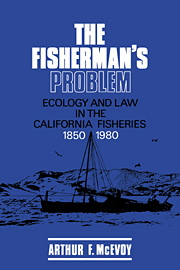
-
Select format
-
- Publisher:
- Cambridge University Press
- Publication date:
- January 2010
- October 1986
- ISBN:
- 9780511583681
- 9780521324274
- 9780521385862
- Dimensions:
- (228 x 152 mm)
- Weight & Pages:
- 0.75kg, 392 Pages
- Dimensions:
- (228 x 152 mm)
- Weight & Pages:
- 0.608kg, 392 Pages
You may already have access via personal or institutional login
Book description
The living resources of California's rivers and coastal waters are among the most varied and productive in the world. They also offer a laboratory example of the mismanagement and waste that have attended the settlement and development of the North American continent. The Fisherman's Problem is a study of the interaction among resource ecology, economic enterprise, and law in the history of the California fishing industry. It analyzes the ways in which the natural environment not only provided the raw material for economic development but played an active role in it as well. As this book shows, the natural environment has a history both independent of, and yet influenced by, classic example of 'common property' re-environmental conservation generally, as well as in the management of the fisheries of the world's rivers and oceans. Professor McEvoy discusses the different ways in which human communities have harvested and managed the region's fisheries, from those of the American Indians and immigrants from Europe and Asia to those of modern, industrial-bureaucratic society. By reconstructing the ecological history of the fisheries during the nineteenth and twentieth centuries, this study develops a new perspective on environmental problems as contemporary observers understood them and on the results of their efforts to deal with those problems. The book concludes with an analysis of significant changes taking place in the 1970s and 1980s in the politics and theory of resource management. By combining a synthesis of recent scholarship in such disciplines as law, economics, marine biology, and anthropology with original research into the fishing industry's history, the book represents a significant new departure in the study of ecology and change in human society.
Reviews
‘This is a lucid and imaginative account of the interaction between nature, the economic struggle, and the American legal order. It is a strong contribution to the socio-legal history of our country.’
Lawrence M. Friedman - Stanford Law School
Contents
Metrics
Altmetric attention score
Full text views
Full text views help Loading metrics...
Loading metrics...
* Views captured on Cambridge Core between #date#. This data will be updated every 24 hours.
Usage data cannot currently be displayed.
Accessibility standard: Unknown
Why this information is here
This section outlines the accessibility features of this content - including support for screen readers, full keyboard navigation and high-contrast display options. This may not be relevant for you.
Accessibility Information
Accessibility compliance for the PDF of this book is currently unknown and may be updated in the future.


